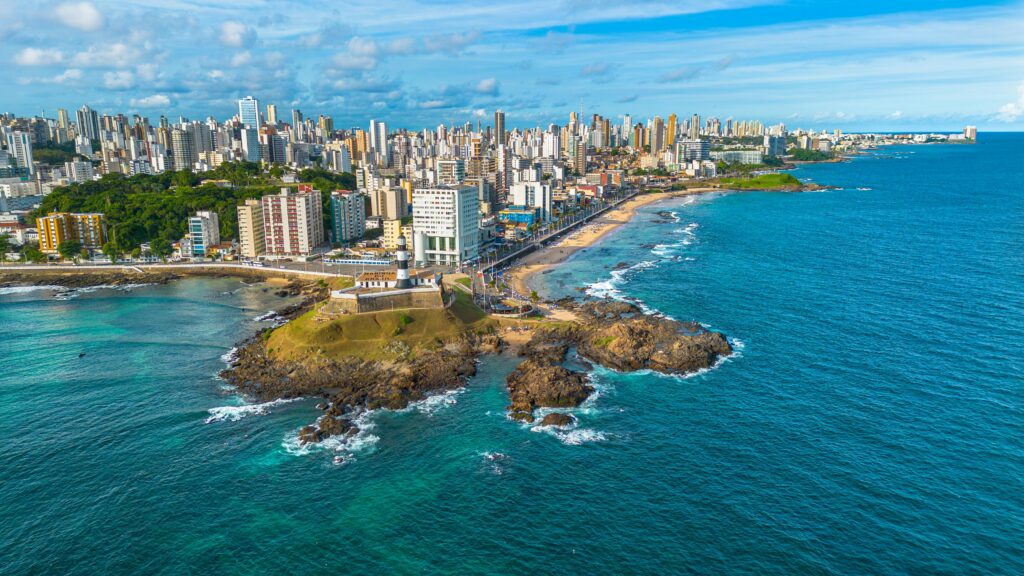El Salvador is emerging as both a surf haven and a destination for U.S. incarceration under President Nayib Bukele’s ambitious agenda. On one hand, millions of dollars have poured into coastal infrastructure—new highways, world-class surf camps, and hotel zones branded “Surf City” and “Surf City 2.” On the other, Bukele’s hard-line security policies have led to mass arrests—over 80,000 people jailed under a state of emergency—and a high-profile agreement to house U.S. detainees in the Terrorism Confinement Center (CECOT). This article explores how these seemingly contradictory strategies intersect, the promises and pitfalls for tourism, and what travelers and human-rights advocates should know.

Surf City: Riding the Tourism Wave
- Infrastructure Investments: New coastal highways connect vibrant beach towns like El Sunzal and El Zonte, shortening transfer times and opening up previously remote breaks. Surf camps, beachfront hotels, restaurants, shops, even tattoo parlors have sprung up around black-sand shores.
- Economic Impact: Tourism arrivals hit a record 3.9 million in 2024 (up from 3.4 million in 2023), contributing about 14 percent of GDP—more than double its 6 percent share in 2019. The government estimates the surf-tourism projects will generate half a million jobs and $4 billion in revenue over ten years.
- Global Entry & Safety Ratings: El Salvador joined the U.S. Global Entry program and was upgraded to a Level 1 (low risk) travel advisory by the State Department—on par with Argentina, Australia, and Greece. Cheaper flights, uncrowded breaks, and pupusa-filled street stalls position it as an alternative to Costa Rica and Mexico.
CECOT: Exporting U.S. Incarceration
- The Prison Deal: In early 2025, the U.S. began transferring more than 200 detainees—many never convicted—to CECOT, a modern “Terrorism Confinement Center” built to house both Salvadoran convicts and foreign suspects. Critics argue due process is often ignored: inmates are rounded up en masse, sometimes arbitrarily, then jailed indefinitely.
- Human-Rights Concerns: Images of shaved-headed men cramped into cells have drawn comparisons to mass-detention camps. International observers warn of rights abuses; the Supreme Court ordered the return of one wrongly deported Maryland resident, yet Bukele and U.S. leadership have resisted.
- Political Calculus: Bukele’s tough-on-crime approach—modeled on other populist leaders—has fueled his domestic approval ratings. Many Salvadorans feel safer: homicide rates plummeted from world-leading levels a decade ago to among the lowest in Central America. But the crackdown has also silenced dissent and sparked fears of unchecked executive power.
Tourism vs. Toughness: A Delicate Balance
- Perception Risks: While local operators report no immediate downturn in bookings, some travelers hesitated or canceled spring-break surf trips over ethical and safety concerns. Boutique agencies note questions about whether visiting equals endorsing mass incarceration.
- Local Voices: Tour guide Alfredo Avalos praises the drop in gang extortion, saying “safety sells.” Surf-camp owner Pedro Querejeta compares El Salvador to Singapore—highly policed yet booming tourist hub. Yet both acknowledge the moral complexity of U.S. detainees in their jails.
- Advisory Divergence: Canada and the U.K. still urge caution, citing risks of arbitrary enforcement and limited consular access. Risk-management experts rank El Salvador medium-risk—higher than Costa Rica or Panama—due to petty crime, tropical storms, and infrastructure gaps.
Beyond the Headlines: The Real-World Experience
Travelers who venture beyond the prison stories recount vivid encounters: tidal-pool exploration under looming volcanoes, ceviche picnics on volcanic sands, and paddle-out sessions beside expert local surfers. These authentic moments, advocates say, can reshape perceptions—transforming “hidden gem” status into broader cultural respect.

Conclusion
El Salvador’s strategy to pair sun-and-surf development with a draconian security model poses a unique dilemma. Robust tourism growth underscores global hunger for new destinations, yet the human-rights cost of mass incarceration—and housing foreign detainees—casts a long shadow. For travelers and investors, the choice comes down to whether the promise of warm waves and rapid-growth revenues outweighs concerns about rule-of-law and due-process. Ultimately, the country’s long-term success will hinge on balancing safety with justice, ensuring that the future of El Salvador resonates beyond prison walls.
Frequently Asked Questions (FAQs)
Q1: Is it safe to visit El Salvador right now?
The U.S. rates it Level 1 (low risk) and Global Entry–approved, but some governments still advise caution due to petty crime and potential arbitrary enforcement.
Q2: What is CECOT and who is housed there?
The Terrorism Confinement Center detains Salvadoran convicts, U.S. detainees—including some never tried—and suspects under state-emergency laws, raising due-process concerns.
Q3: How has tourism grown under Bukele?
Arrivals reached 3.9 million in 2024, tourism’s GDP share jumped to 14 percent, and coastal projects promise 500,000 new jobs over ten years.
Q4: What are the main tourism draws?
World-class surf breaks, volcanic beaches, vibrant pupusa cuisine, colonial-era San Salvador sights, and the burgeoning Valle de Guadalupe wine region.
Q5: Do local businesses feel the prison deal’s impact?
Most report no cancellations so far but remain vigilant, emphasizing that safety improvements from the crime crackdown have fueled tourism more than prison images have deterred it.
Q6: How can travelers mitigate risks?
Use registered tour operators, heed local advisories, avoid night travel on isolated roads, and consider comprehensive travel-insurance and emergency-response services.

Sources The Washington Post


